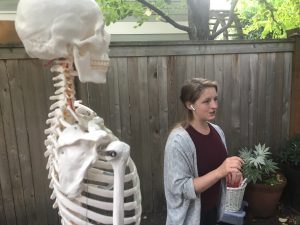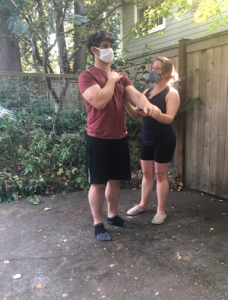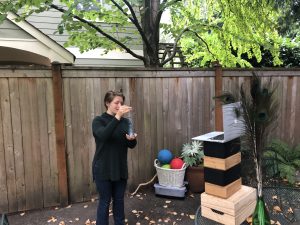
My particular love of solo performance began with performance poetry when I was in high
school. I was captivated by the rhythm and the fire of the poets I went to see. I was so
impressed by their command over the room. Eventually I started to write and perform as well, beginning in quirky coffee shops, onto some larger stages, and was nominated to compete in the Women of the World International Poetry Slam. I didn’t go. Instead, I moved to Liverpool to get my bachelor’s degree in acting. I love the electricity of being on stage, and the field is exceptionally charged when sharing my own creation with an audience. Nothing tops the high of performing when I am so intimately connected to the story and to my larger purpose for the piece.
In learning the art of solo performance, I am deeply grateful for all my incredible mentors and teachers who have helped me along my journey, including the esteemed director Valerie Curtis-Newton and internationally recognized Cathy Madden. I am especially grateful to Cathy for teaching me the Alexander Technique process, so I know how to help myself.
Solo performance is a whole self event. Any art you make is a reflection of your unique history and limitless imagination. Solo performance asks for the full use of your intellect and emotional breadth. It requires the use of your body as the sole instrument for transmission to an audience. I’ve found it’s enormously beneficial to approach this kind of creative work with a deep respect of my wholeness. When operating from the perspective of wholeself, I have a heightened ability to take in the world with my senses, which gives me fuller access to my emotional range. I enjoy a freer flow of my imagination as well as a more precise ability to communicate what I intend. All this means I can extend a clearer call to action to the audience for which I made my art.
When making a show, I use Integrative Alexander Technique at every step. I ask to coordinate so my head can move, so the rest of me can follow so I can think about my show, dance my ideas, write them, arrange and rearrange them. I ask to coordinate in order to breath, sit, type, walk, speak, rehearse and – of course – to invite my audience to be with me, while I’m with them, from the very first moment.

What I find is by asking for optimal coordination from the start, creative doorways open and ideas arrive as gifts from my system. Each new idea reveals the next step. When I function as a whole, I don’t get “stuck” – and if I do, I am armed with a process for unsticking. I continually gather information and create constructive plans. I know I already have what I need, and that when I ask myself for good coordination, it’s easier to see it.
As I write this article, I am also writing my next piece. I’ve come to realize my whole creative process follows the same steps I would use in order to apply Alexander Technique to any any other activity, just on a more macro scale. It all begins with desire. I have something to say. I recognize my desire to share it. I decide to get to work and write a show.
Phase two is all about gathering information. For a period of time I write all my ideas down on scraps of paper, gather objects of inspiration, collect images, and put all of those things in a fabric bag that hangs on my bedroom door knob. My bag of ideas is the seedling of my whole show. This gathering information stage goes on to include asking myself essential questions such as, Who is my audience? What is my artistic purpose? It goes on to include several bookmarked Google tabs, open books on the desk, and conversations over coffee (or Zoom!) as well.
 Next it’s time to create a plan. In writing a solo performance, this might be composing my script. I continue to insist on wholeness, making choices about how I coordinate (body, mind and heart) through writing, typing, breathing, thinking and, again, inviting my future audience to be with me while I’m with them, while I write this show.
Next it’s time to create a plan. In writing a solo performance, this might be composing my script. I continue to insist on wholeness, making choices about how I coordinate (body, mind and heart) through writing, typing, breathing, thinking and, again, inviting my future audience to be with me while I’m with them, while I write this show.
Now comes the experiment! It’s time for rehearsal. The more specific I can be with my experiment for each and every rehearsal, the more effective I am. What do I want to discover this time? What do I want to find out? I ask myself to coordinate so that I can carry out my specific rehearsal experiment (continuing to invite my future audience to be with me, while I’m with them.) From each rehearsal experiment, I have gathered more information and the cycle repeats until the very last moment of closing night.
When I perform my work for an audience, I am inviting them to a living moment, whether on the stage or through a lens. They are a key ingredient of the experiment. The more personal my work, the more essential it is I am clear of my purpose in making it. I need to know how I’d like to change the world in some small way, so I can stay motivated to see the experiment through. Honoring my wholeness and choosing good coordination from start to finish means my experiments are more likely to be a success.
Right now, in these difficult times of isolation and important social change, the world needs more art. Your art is a rich contribution to the world. Each of our stories illuminate shadows, they shine light on overlooked places. Stories connect us. Solo performance is a great way to be making art right now. It is a way to stay active, as you care for the world. In Integrative Solo Performance, my intention is to help you design your process, thinking and moving whole, so you can set yourself up for success from the first word to the final curtain call.
-Alyssa Franks
September, 2020
________________________________________________________________
Integrative Solo Performance with Alyssa Franks begins Thursday, October 1 at 5:30pm. All fall classes, as well as more information and registration are available here.


